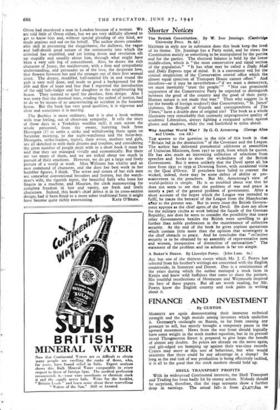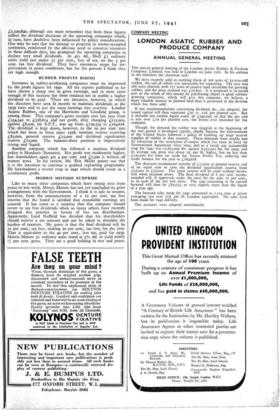FINANCE AND INVESTMENT
By CUSTOS
MARKETS are again demonstrating their immense technical strength and the high morale among investors which underlies it. Germany's onslaught on Russia, so far from causing any pressure to sell, has merely brought a temporary pause in the upward movement. News from the war front should logically have some weight in the stock market equation, but in its present mood Throgmorton Street is prepared to give hope the benefit of almost any doubts. So prices are already on the move again, and gilt-edged are bumping up against their war-time records. Cynics may sneer at this sort of behaviour, but who would maintain that there could be any advantage in a slump? So long as the real task of war production is being effectively tackled, it is all to the good that the stock markets should hold up.
SHELL TRANSPORT PROFITS With its widespread Continental interests, the Shell Transport and Trading has been badly hit by enemy action. Nobody should be surprised, therefore, that the 1940 accounts show a further drop in earnings. The actual fall• is from £2,477,844 to £2,329,840, although one must remember that both these figures reflect the dividend decisions of the operating companies which, in turn, have doubtless been influenced by policy considerations. One may be sure that the damage to property in enemy-occupied territories, reinforced by the obvious need to conserve resources in these difficult days, has prompted the operating companies to declare very small dividends. At 42s. 6d., Shell £r ordinary units yield just under 21 per cent., free of tax, on the 5 per cent. tax free dividend. They have enormous scope for im- provement in peace conditions, but for the present I think they are high enough.
RUBBER PROFITS RISING
Investors in rubber-producing companies must be impressed by the profit figures for 1940. All the reports published so far have shown a sharp rise in gross earnings, and in most cases enough of this increase has been retained net to enable a higher dividend to be paid. There are instances, however, in which the directors have seen fit merely to maintain dividends at the 1939 rates and to put the extra earnings into reserves. London Asiatic Rubber, one of the Harrisons and Crosfield group, is among these. This company's gross receipts rose last year from £334,342 to £528,814 and net profit, after charging £125,000, against £6,500, for E.P.T., was up from £139,335 to £164,618. The dividend is kept down, however, to the to per cent. rate which has been in force since 1938, taxation reserve receiving £83,000, general reserve £15,000 and dividend equalisation reserve £r5,000. The balance-sheet position is impressively strong and liquid.
Another company which has followed a cautious dividend policy is Mendaris (Sumatra). Net profit was moderately higher, but shareholders again get 4 per cent. and £7,500 is written off mature areas. In his review, Mr. Eric Miller points out that it is the intention to continue a gradual replanting programme. He foreshadows a record crop in 1941 which should result in a satisfactory profit.
MORRIS MOTORS SURPRISE
Like so many other companies which have swung over from peace to war work, Morris Motors has not yet concluded its price arrangements with the Government. I think it is safe to assume, however, from the announcement of a to per cent. tax free interim that the board is satisfied that reasonable earnings are assured. It has come as a surprise that this company should revert to tax free dividends when so many others have recently dropped this practice in favour of less tax distributions. Apparently, Lord Nuffield has decided that his shareholders should receive a net amount and not be asked to shoulder the burden of taxation. My guess is that the final dividend will be to per cent., tax free, making 20 per cent., tax free, for the year. That is equivalent to the 4o per cent., less tax, paid for 1939. Morris Motors 5s. ordinary units stand at 27s. 6d. to yield nearly 7/ per cent. gross. They are a good holding in war and peace.























 Previous page
Previous page